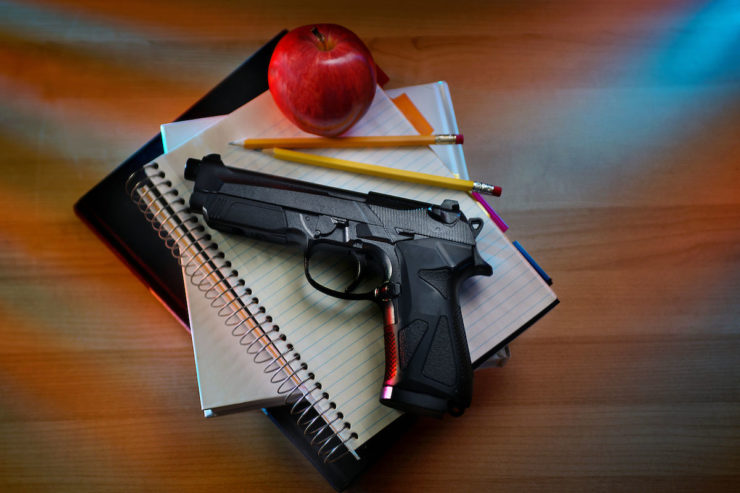Ou
For most college administrators, the summer months offer a short break from the day-to-day responsibilities of running a college campus. After commencement and student move outs, the pace typically slows down for at least a few weeks, providing a much needed opportunity to relax, reflect and refocus.
Not this year. Not with July 1 bearing down on Georgia’s colleges and universities like the heat of the afternoon sun.
Soon Georgia will become one of 10 states in the country to allow guns on campus. Students over the age of 21 with concealed weapons permits will be legally allowed to carry firearms into what is supposed to be an environment reserved for learning.
Campus administrators from top to bottom are now feverishly trying to figure out how to not only manage students, but students with weapons – everywhere from the classroom to the student union.
The bill, signed by Governor Deal on May 4, leaves many – the University System of Georgia, professors, parents and students – with many unanswered questions.
- Where, exactly, are students supposed to store weapons, considering that dormitories, fraternity and sorority houses are off limits and no provisions have been made for gun lockers?
- How will local law enforcement, campus police, administrators, students and others know whether a weapon is for personal safety?
- Could a permit-carrying student turn into a permit-carrying active shooter? Could a conversation on a controversial topic end with guns drawn?
- How will students – let alone teachers – comfortably function in a setting where a weapon can speak louder (and more lethally) than words?
- How does an environment that allows guns put the safety, security and wellbeing of the campus community first?
Questions like these are enough to keep an entire campus—and especially its leadership—on edge.
Take a situation like the recent “glue gun” incident at Colgate University in upstate New York. A student carrying a glue gun for an art project was thought to be an active shooter, prompting the school to send two late night security warnings, reporting an active shooter and calling for a campus-wide lockdown.
What if an armed student drew a weapon to combat this “active shooter”? The possibilities are endless and potentially tragic. How can a situation like this be conveyed in an accurate and timely manner to the larger campus community without causing mass hysteria?
Let’s not forget how pervasive (and influential) social media is on campus. One photo of a weapon on a person or in a vehicle could escalate to active shooter rumors in the blink of an eye. And once they go viral, a campus will be thrust into crisis mode regardless of whether the threat is real.
For public colleges and universities here in Georgia and elsewhere (Arkansas just passed a campus carry law of its own), this law means there’s a lot of work to do in a short amount of time, including:
- Educating numerous internal and external audiences about what these laws mean and how they will be enforced. This will take time, especially when the majority of the community is off campus during the summer months.
- Developing policies and plans for how to appropriately handle angst and unrest as a result of the law’s passage.
- Preparing for how specific incidents will be handled, and by whom.
- Determining how to manage reports of a gun on campus. What types of situations require campus-wide alerts? What if teachers refuse to teach classes with students who are legally carrying weapons (it’s already happened in Kansas, another campus carry state)? How will campus safety be trained to respond and defuse situations where weapons may be present?
These are just some of the real situations that deserve thoughtful consideration and even more thoughtful planning and response, here in Georgia and across the country.
Otherwise we have our esteemed lawmakers to thank for creating the newest oxymoron in higher education: campus safety.





















